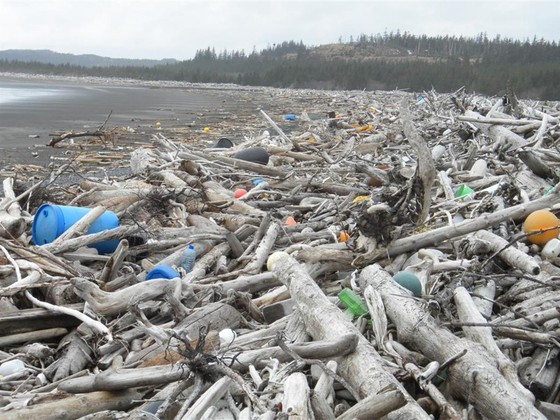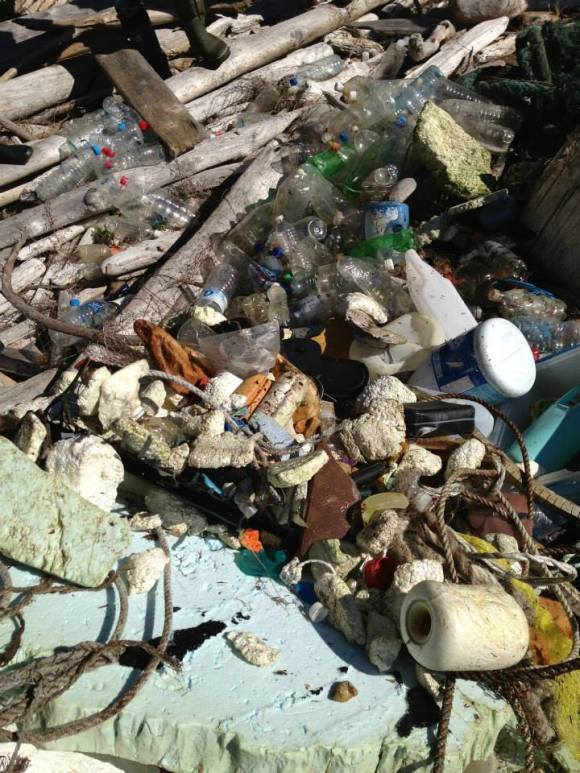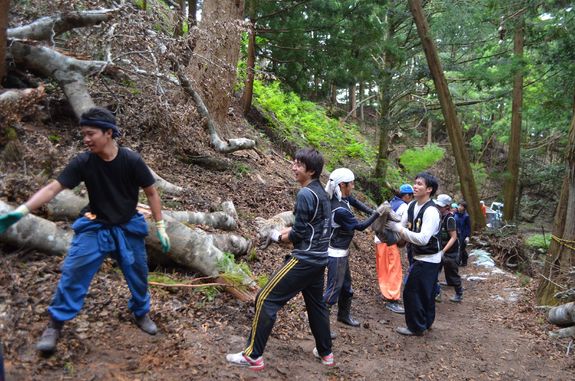
On 11 March, 2011 Hiroki Takai was studying at a university in Vancouver. Instead of feeling helpless at the steadily flowing images of destruction in the media following the Tohoku Earthquake and tsunami, he quickly took action and gathered other Japanese students to raise money for their homeland. Thanks to the students’ efforts and the generosity of the people of Vancouver the “Japan Love Project” managed to raise CAN$320,000 (US$288,000) in aid.
Now, with the 3-year anniversary of the Great Tohoku Earthquake approaching, Takai wanted to pay the kindness of the Canadians back. As a part of the International Volunteer University Student Association (IVUSA) he asked for a team to travel to the West coast of Canada to help clean up the still-increasing driftage that is washing up on its shores. Headed by fourth-year Ritsumeikan University student Yusuke Oike, a crew of 70 students answered the call.
Oike is a member of the Ai Tsunagu Project, a part of the IVUSA that has been active at relief and rebuilding efforts in earthquake and tsunami affected areas of Japan. In this Canadian project their goal is threefold.
First, from 7 to 14 March the students aim to remove ten tons of debris from the beaches of Vancouver Island. Although ten tons sounds like a lot, it’s only a portion of the 1.5 million tons that the Ministry of the Environment has estimated to have been floating in the Pacific Ocean since 2011.
The group is working in cooperation with Karla Robison, the environmental and emergency services manager in Ucluelet who will help to process the collected debris. According to Yahoo! Japan News she said, “I’m thrilled to have so many students come to help. It’s real proof of their friendship.”
Secondly, the students also hope to recover any sentimental items that may have survived the trip to North America and return them to their owners. Perhaps something as simple as a lost trinket could help bring solace to a struggling family in Japan. Unfortunately, even with 70 volunteers it is a large job in a short time. Moreover, much of it will be done in remote parts of Vancouver Island.

As of this writing and with a little over one day left, they have received 1,323,000 yen ($12,000), but still need more to cover their work expenses. If they don’t make it at least Oike and the others will have achieved their third goal of the project and probably the most important one: to stop the memory of the 3-11 tragedy from fading out of people’s minds. Whether it’s the environmental damage on the west coast of Canada or the suffering of the displaced people on the east coast of Japan, even three years on we should remember that their pain isn’t fading away without our help in any way we can.
Source: Readyfor via Yahoo! News Japan (Japanese)
Video: YouTube – Akao Nanako
***If you’d like to donate (before the end of February) or learn more about the Ai Tsunagu Project you can go to the Readyfor? website or their Facebook page.***


 Canadian rugby team volunteers in typhoon-struck Japan following cancellation of World Cup match
Canadian rugby team volunteers in typhoon-struck Japan following cancellation of World Cup match Half of Tokyo’s universities to use credits to “convince” students to volunteer in 2020 Olympics
Half of Tokyo’s universities to use credits to “convince” students to volunteer in 2020 Olympics The top 10 universities in Japan determined by 2021 World University Rankings
The top 10 universities in Japan determined by 2021 World University Rankings Japanese teams use orange flags as a tsunami alert signal for swimmers and surfers
Japanese teams use orange flags as a tsunami alert signal for swimmers and surfers Japan ministry urges universities to adjust curriculum to accommodate student Olympic volunteers
Japan ministry urges universities to adjust curriculum to accommodate student Olympic volunteers Disney princesses get official manga makeovers for Manga Princess Cafe opening in Tokyo
Disney princesses get official manga makeovers for Manga Princess Cafe opening in Tokyo Beautiful new Final Fantasy T-shirt collection on the way from Uniqlo【Photos】
Beautiful new Final Fantasy T-shirt collection on the way from Uniqlo【Photos】 Randomly running into a great sushi lunch like this is one of the best things about eating in Tokyo
Randomly running into a great sushi lunch like this is one of the best things about eating in Tokyo Is the new Shinkansen Train Desk ticket worth it?
Is the new Shinkansen Train Desk ticket worth it? Foreign English teachers in Japan pick their favorite Japanese-language phrases【Survey】
Foreign English teachers in Japan pick their favorite Japanese-language phrases【Survey】 Sakura season schedule is screwed up, so we had a no-cherry blossom cherry blossom party in the office
Sakura season schedule is screwed up, so we had a no-cherry blossom cherry blossom party in the office Cappuccino Ramen becomes super popular in Japan, but is it worth the hype?
Cappuccino Ramen becomes super popular in Japan, but is it worth the hype? Osaka’s creepy cute mascot speaks for first time, adds more fuel the creepy OR cute debate【Video】
Osaka’s creepy cute mascot speaks for first time, adds more fuel the creepy OR cute debate【Video】 Is Japan’s massive Shizuoka steak sandwich really as delicious as it looks in promo photos?
Is Japan’s massive Shizuoka steak sandwich really as delicious as it looks in promo photos? Kyushu-exclusive Black Mont Blanc goes nationwide in a “Special” way
Kyushu-exclusive Black Mont Blanc goes nationwide in a “Special” way We try out “Chan Ramen”, an underground type of ramen popular in the ramen community
We try out “Chan Ramen”, an underground type of ramen popular in the ramen community New Studio Ghibli bedding sets are cool in all senses of the word
New Studio Ghibli bedding sets are cool in all senses of the word Our Japanese reporter visits Costco in the U.S., finds super American and very Japanese things
Our Japanese reporter visits Costco in the U.S., finds super American and very Japanese things New Pokémon cakes let you eat your way through Pikachu and all the Eevee evolutions
New Pokémon cakes let you eat your way through Pikachu and all the Eevee evolutions There’s a park inside Japan where you can also see Japan inside the park
There’s a park inside Japan where you can also see Japan inside the park Japanese convenience store packs a whole bento into an onigiri rice ball
Japanese convenience store packs a whole bento into an onigiri rice ball Hanton rice — a delicious regional food even most Japanese people don’t know about, but more should
Hanton rice — a delicious regional food even most Japanese people don’t know about, but more should Final Fantasy, Kingdom Hearts, and Dragon Quest pet product line announced by Square Enix
Final Fantasy, Kingdom Hearts, and Dragon Quest pet product line announced by Square Enix Studio Ghibli releases Kiki’s Delivery Service chocolate cake pouches in Japan
Studio Ghibli releases Kiki’s Delivery Service chocolate cake pouches in Japan Japan’s bone-breaking and record-breaking roller coaster is permanently shutting down
Japan’s bone-breaking and record-breaking roller coaster is permanently shutting down New definition of “Japanese whiskey” goes into effect to prevent fakes from fooling overseas buyers
New definition of “Japanese whiskey” goes into effect to prevent fakes from fooling overseas buyers Foreign passenger shoves conductor on one of the last full runs for Japan’s Thunderbird train
Foreign passenger shoves conductor on one of the last full runs for Japan’s Thunderbird train Kyoto bans tourists from geisha alleys in Gion, with fines for those who don’t follow rules
Kyoto bans tourists from geisha alleys in Gion, with fines for those who don’t follow rules Studio Ghibli unveils Mother’s Day gift set that captures the love in My Neighbour Totoro
Studio Ghibli unveils Mother’s Day gift set that captures the love in My Neighbour Totoro Domino’s Japan now sells…pizza ears?
Domino’s Japan now sells…pizza ears? Toyota built a life-sized Miraidon Pokémon and are letting people test drive it this weekend
Toyota built a life-sized Miraidon Pokémon and are letting people test drive it this weekend New Japanese KitKat flavour stars Sanrio characters, including Hello Kitty
New Japanese KitKat flavour stars Sanrio characters, including Hello Kitty Sales of Japan’s most convenient train ticket/shopping payment cards suspended indefinitely
Sales of Japan’s most convenient train ticket/shopping payment cards suspended indefinitely Sold-out Studio Ghibli desktop humidifiers are back so Totoro can help you through the dry season
Sold-out Studio Ghibli desktop humidifiers are back so Totoro can help you through the dry season Japanese government to make first change to romanization spelling rules since the 1950s
Japanese government to make first change to romanization spelling rules since the 1950s Ghibli founders Toshio Suzuki and Hayao Miyazaki contribute to Japanese whisky Totoro label design
Ghibli founders Toshio Suzuki and Hayao Miyazaki contribute to Japanese whisky Totoro label design Doraemon found buried at sea as scene from 1993 anime becomes real life【Photos】
Doraemon found buried at sea as scene from 1993 anime becomes real life【Photos】 Tokyo’s most famous Starbucks is closed
Tokyo’s most famous Starbucks is closed One Piece characters’ nationalities revealed, but fans have mixed opinions
One Piece characters’ nationalities revealed, but fans have mixed opinions We asked a Uniqlo employee what four things we should buy and their suggestions didn’t disappoint
We asked a Uniqlo employee what four things we should buy and their suggestions didn’t disappoint Princesses, fruits, and blacksmiths: Study reveals the 30 most unusual family names in Japan
Princesses, fruits, and blacksmiths: Study reveals the 30 most unusual family names in Japan Studio Ghibli’s new desktop Howl’s Moving Castle will take your stationery on an adventure
Studio Ghibli’s new desktop Howl’s Moving Castle will take your stationery on an adventure Video asks young Japanese adults what they know about Canada. Do they know more than you?【Video】
Video asks young Japanese adults what they know about Canada. Do they know more than you?【Video】 Five years on, Google Maps updates images of areas affected by 2011 earthquake and tsunami
Five years on, Google Maps updates images of areas affected by 2011 earthquake and tsunami Spirit of volunteering strong for Tokyo 2020 Olympics, but data suggests something may be off
Spirit of volunteering strong for Tokyo 2020 Olympics, but data suggests something may be off Hooked on helping: The man who is running the length of Japan for tsunami relief
Hooked on helping: The man who is running the length of Japan for tsunami relief Japanese Americans tell STORIES FROM TOHOKU
Japanese Americans tell STORIES FROM TOHOKU “Silence Straw” — Kyoto University raising money to fight noises caused by drinking straws
“Silence Straw” — Kyoto University raising money to fight noises caused by drinking straws LoCoS: The universal language we’ll be using by 2065, according to legendary Japanese designer
LoCoS: The universal language we’ll be using by 2065, according to legendary Japanese designer 9 futuristic jobs we could see by 2030
9 futuristic jobs we could see by 2030 NHK TV worker woken by earthquake, gives viewers a show by accident
NHK TV worker woken by earthquake, gives viewers a show by accident Tohoku aid charity Knit For Japan attempts world record blanket
Tohoku aid charity Knit For Japan attempts world record blanket Japan surprised to find Justin Bieber and world praying for them
Japan surprised to find Justin Bieber and world praying for them Japanese travel provider under fire for guaranteeing flyers would sit next to a college girl
Japanese travel provider under fire for guaranteeing flyers would sit next to a college girl Off-road bikes added to Japan’s disaster relief arsenal
Off-road bikes added to Japan’s disaster relief arsenal Canada’s official Twitter asks which Pokémon is “the most Canadian,” overwhelmed by responses
Canada’s official Twitter asks which Pokémon is “the most Canadian,” overwhelmed by responses
Leave a Reply